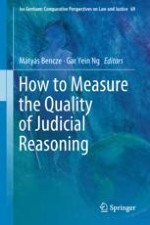
2018 | OriginalPaper | Chapter
Measuring the Unmeasurable?
Authors : Mátyás Bencze, Gar Yein Ng
Published in: How to Measure the Quality of Judicial Reasoning
Publisher: Springer International Publishing
Activate our intelligent search to find suitable subject content or patents.
Select sections of text to find matching patents with Artificial Intelligence. powered by
Select sections of text to find additional relevant content using AI-assisted search. powered by